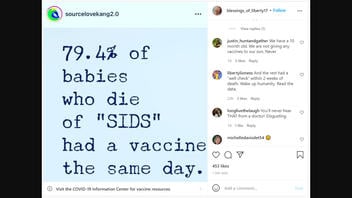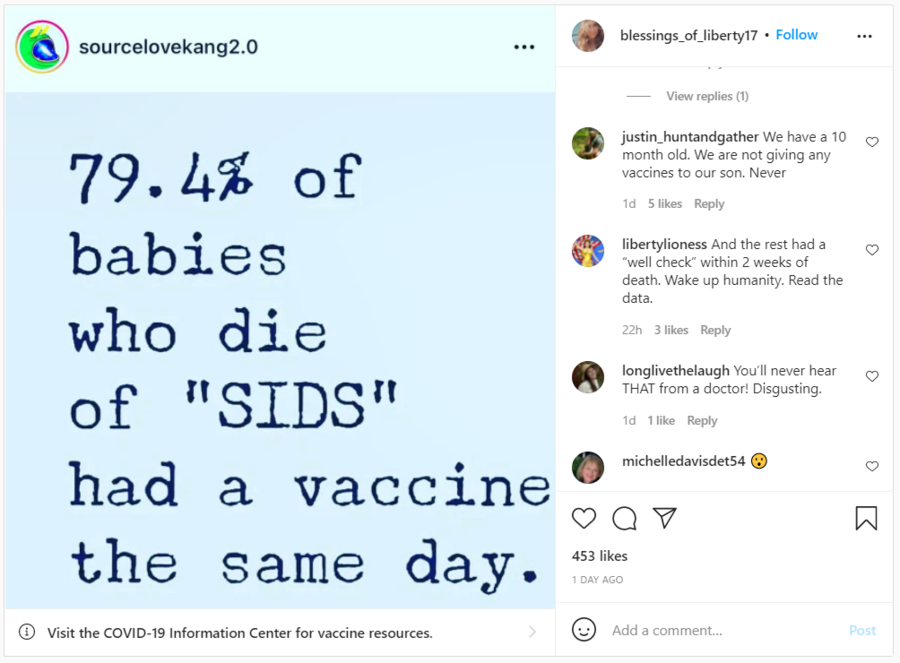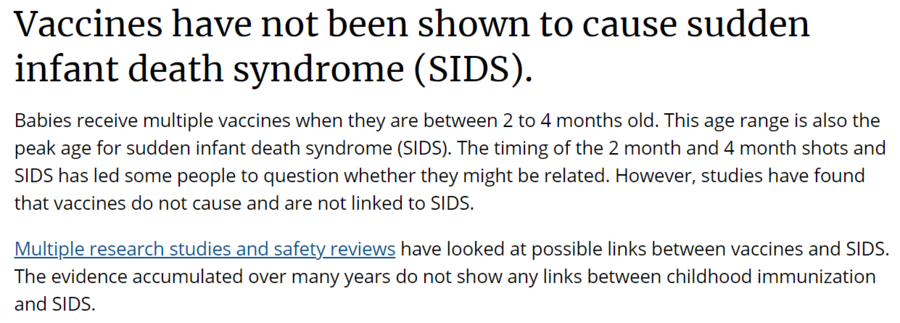
Did nearly 80% of the babies who died of sudden infant death syndrome (SIDS) have a vaccine the same day? No, that's not true. The number appears to come from misinterpreted materials from the Vaccine Adverse Event Reporting System (VAERS), an alert system operated by the Centers for Disease Control and Prevention (CDC) and the Food and Drug Administration (FDA). The CDC says vaccines have not been shown to cause SIDS.
The claim appeared in multiple Instagram posts like this one (archived here) on October 27, 2021, that said.
79.4% of babies who die of 'SIDS' had a vaccine the same day
This is what the post looked like on Instagram on October 28, 2021:
(Source: Instagram screenshot taken on Thurs Oct 28 15:15:26 UTC 2021)
The misconstrued information comes from a 2015 study, published in Clinical Infectious Diseases based on reports submitted to VAERS. It researched reports from 1997 to 2013 for deaths after any vaccination. Its conclusion:
(Source: Clinical Infectious Diseases screenshot taken on Thurs Oct 28 15:46:51 2021 UTC)
The study reported 2,149 deaths during those 16.5 years. Most of the deaths (1,165) were in infants less than a year old. According to the VAERS website, tens of millions of infants were immunized during the years of the study looked at:
Millions of vaccines are given each year to children less than 1 year old in the United States, usually between 2 and 6 months of age. At this age, infants are at greatest risk for certain medical adverse events, including high fevers, seizures, and sudden infant death syndrome (SIDS). Some infants will experience these medical events shortly after a vaccination by coincidence.
The mixed-up data appears to come from a line in the 2015 study that says:
Among the 1469 reports in children aged 0-17 years, 1166 (79.4%) received >1 vaccine on the day of vaccination.
What the study is saying is that for children who were vaccinated, 79.4% of them received more than one vaccine on the same day, the CDC's Martha Sharan said in an October 28, 2021, email to Lead Stories. It's not necessarily talking about the day they died. The average period from vaccination to death was two days for that group, the study says. Sharan adds:
This does not mean that the vaccine caused the death, only that the death occurred sometime after the person got the vaccine. CDC and FDA investigate all reports of death following vaccination.
Many debunked claims about vaccine deaths misuse the list of reports in VAERS. VAERS is a database co-managed by the CDC and the FDA to operate as an early warning system. If a cluster of reports suggests an unexpected side effect of a vaccine, the reports are then investigated to learn if they are accurate and if other factors correlate to the cluster. The database is open, meaning that although health professionals and vaccine manufacturers are required to report certain events, the reporting site is open to anyone with an internet connection in hopes of capturing as many reports as possible. The reports are not vetted or in any way confirmed, and multiple reports may be entered for the same case. As a result, VAERS lists that have not been extracted and investigated do not prove that any vaccine is the direct cause of an adverse event. As the "Guide to Interpreting VAERS Data" explains:
When evaluating data from VAERS, it is important to note that for any reported event, no cause-and-effect relationship has been established. Reports of all possible associations between vaccines and adverse events (possible side effects) are filed in VAERS. Therefore, VAERS collects data on any adverse event following vaccination, be it coincidental or truly caused by a vaccine. The report of an adverse event to VAERS is not documentation that a vaccine caused the event.
Listing several studies, the CDC website says there's no connection between vaccines and SIDS:
(Source: CDC screenshot taken on Thurs Oct 28 16:07:32 2021 UTC)
To prove its point the CDC cites seven studies showing no link between childhood immunizations and SIDS. You can find them here.




















